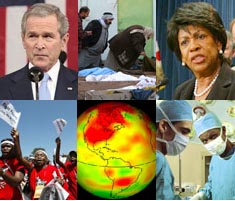In 4th State of the Union Since Invasion of Iraq
Democracy Now! | 24.01.2007 23:49 | Analysis | Anti-militarism | Terror War | World

Withdraw US troops from Iraq
Despite increasing opposition, President Bush vowed last night to escalate the war in Iraq and proceed with his plan to send 21,000 more troops to Iraq. He urged Congress to give his new Iraq strategy “a chance to work.”
Despite increasing opposition, President Bush vowed last night to escalate the war in Iraq and proceed with his plan to send 21,000 more troops to Iraq. He urged Congress to give his new Iraq strategy “a chance to work.” Speaking about the so-called war on terror, President Bush said the United States would remain at war until the evil that inspired 9/11 no longer exists. The president mentioned Iran five times and accused it of funding Shiite militants in Iraq as well as Hezbollah in Lebanon.
As for Iraq - the president warned that the United States would face a nightmare scenario if the military’s mission in Iraq failed.
President Bush.
After President Bush gave his State of the Union address, newly elected Senator Jim Webb of Virginia gave the Democrats’ official response.
Sen. Jim Webb (D-VA).
AMY GOODMAN: As for Iraq, the President warned the United States will face a “nightmare scenario” if the military's mission in Iraq fails.
PRESIDENT GEORGE W. BUSH: Many in this chamber understand that America must not fail in Iraq, because you understand that the consequences of failure would be grievous and far-reaching. If American forces step back before Baghdad is secure, the Iraqi government would be overrun by extremists on all sides. We could expect an epic battle between Shia extremists backed by Iran and Sunni extremists aided by al-Qaeda and supporters of the old regime. A contagion of violence could spill out across the country, and in time the entire region could be drawn into the conflict.
For America, this is a nightmare scenario. For the enemy, this is the objective. Chaos is the greatest ally -- their greatest ally -- in this struggle. And out of chaos in Iraq would emerge an emboldened enemy with new safe havens, new recruits, new resources, and an even greater determination to harm America. To allow this to happen would be to ignore the lessons of September the 11th and invite tragedy. Ladies and gentlemen, nothing is more important at this moment in our history than for America to succeed in the Middle East, to succeed in Iraq and to spare the American people from this danger.
AMY GOODMAN: After President Bush gave his State of the Union address, newly elected Senator Jim Webb of Virginia gave the Democrats official response.
SEN. JIM WEBB: We need a new direction, not one step back from the war against international terrorism , not a precipitous withdrawal that ignores the possibility of further chaos, but an immediate shift toward strong, regionally based diplomacy, a policy that takes our soldiers off the streets of Iraq cities, and a formula that will in short order allow our combat forces to leave Iraq.
The Occupation: Veteran Correspondent Patrick Cockburn Reports from Iraq
As President Bush calls on Congress to support his call to send more troops to Iraq, we go to Baghdad for a report from London Independent correspondent Patrick Cockburn. [includes rush transcript]
Rep. Maxine Waters Calls on Congressional Colleagues to Join Massive Anti-War Rally
Democratic Rep. Maxine Waters of California has sent a letter to every other member of the House urging them to participate in Saturday’s anti-war protest in Washington. She joins us to talk about her call and her resolution to withdraw US troops from Iraq. [includes rush transcript]
The View from Nairobi: Nobel Peace Laureate Wangari Maathai Reacts to State of the Union from the World Social Forum in Kenya
While President Bush delivered his State of the Union address, more than eighty thousand people have been gathering in Kenya this week for the seventh annual World Social Forum. The theme of the meeting is “People’s Struggles, People’s Alternatives – Another World is Possible.” Nobel laureate Wangari Maathai joins us from Nairobi. [includes rush transcript]
Bush’s New Energy Proposals: A Break from the Past or More of the Same?
President Bush introduced proposals to cut US gasoline consumption by twenty percent over ten years and ease the country’s dependance on foreign oil. The president steered clear of calling for mandatory caps on U.S. carbon dioxide emissions and rejected calls for a commitment to stricter fuel economy rules. Award-winning New York Times science reporter Andrew Revkin analyses President Bush’s proposals. [includes rush transcript]
Critics: New Bush Proposals Shift More Health Care Costs onto Working Americans
Health care advocates are heavily criticizing Bush’s health plan. They say that it actually shifts more of the cost of health care onto working Americans, imposes a new tax on those that already have health care and does nothing to hold down skyrocketing health care costs. We speak with Dr. Steffie Woolhandler, co-founder of Physicians for a National Health Program. [includes rush transcript]
 http://www.democracynow.org/article.pl?sid=07/01/24/1533216
http://www.democracynow.org/article.pl?sid=07/01/24/1533216
Democracy Now!